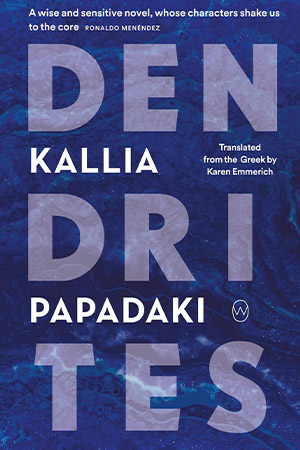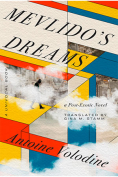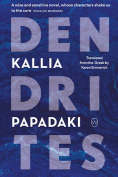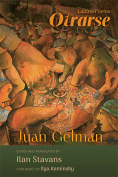Dendrites by Kallia Papadaki
 New York. World Editions. 2024. 228 pages.
New York. World Editions. 2024. 228 pages.
Dendrites marks Greek writer Kallia Papadaki’s third outing as a novelist but her first appearance in the anglophone world. Published in 2015 in Athens, it was deservingly awarded the EU Prize for Literature in 2017.
The end of Dendrites provides insight into its lyrical conception. The last chapter, consisting of a single paragraph, an archival quotation from the Snowflake Bentley Museum in Vermont, addresses the wonderment of snowflakes, their absolute originality and individual beauty. The quote comes from the museum’s founder, Wilson Bentley:
Under the microscope, I found that snowflakes were miracles of beauty; and seemed a shame that this beauty should not be seen and appreciated by others. Every crystal was a masterpiece of design and no one design was ever repeated. When a snowflake melted, that design was forever lost. Just that much beauty was gone, without leaving any record behind. I became possessed with a great desire to show people something of this wonderful loveliness, an ambition to become, in some measure, its preserver.
Masquerading as the real-life photographer Wilson Bentley, the narrator in this last chapter explains his craftmanship, revealing that, like snowflakes, ordinary life must be documented for its charm and loneliness. Indeed, in a fascinating and absorbing read, Dendrites captures the intricate and convoluted lives of everyday people and, like a museum, preserves their stories, aspirations, fears, and ambitions.
Dendrites is an enthralling, multigenerational novel about a Greek immigrant, Nondas Kambanis, who struggles to make a life for himself in the US and his son, Vassilis, who although born in the “promised land” is equally destitute, wondering whether to make the opposite journey back to the “motherland” in search of a better life. Etymologically, “dendrites” derives from the Greek word dendro (tree), which, according to the Oxford Dictionary of Physics, means “a crystal with a branching structure like that of a tree, formed when liquids solidify. The commonest example is the structure of snowflakes.” The title is, therefore, an allusion to both the snowflake metaphor and to the family tree structure; moreover, it addresses the multiplicity and branching of narrative threads that comprise the novel’s story.
Initially, the reader is somewhat disoriented with the divergent plots, each with its distinct timeline; the different focalizations/narrative perspectives; and the stark alternations between granular and overarching descriptions, all of which signify Papadaki’s deft narrative style. As the interconnectedness between characters slowly unfolds, the life of Kambanis emerges as the centrifugal force. He moves to Philadelphia and New Jersey for a better life in the early twentieth century, undergoes various perils, and dies in this foreign land without having managed to ever return to his home in the Greek island of Nisyros. He dies with the hope that one day his son will fulfill the unconsummated dream of visiting his mother’s grave.
Nondas and Vassilis’s personal ordeals are painted in a backdrop of local and global, socioeconomic and politico-historical events that shape their times and determine the kinds of lives they can create for themselves and for their loved ones. Nondas’s involvement with the Italian mafia gets him in trouble with the local Ku Klux Klan; his business is affected by World War I and the post-1929 Great Depression; and during World War II he suffers discrimination for erroneously being associated with Mussolini for having false documents that identify him as Italian. Concurrently, Vassilis struggles with the financial pressures of an impoverished town, Camden, New Jersey, that is overburdened by poverty, unemployment, and crime. Vassilis is also trapped in a waning marriage that involves bringing up two adopted daughters while longing for a child of his own.
Dendrites is not your conventional immigration story, and that’s partly attributed to Papadaki’s adroit storytelling. Combining the seemingly incongruent styles of stream of consciousness—reminiscent of Virginia Woolf’s To the Lighthouse—with the density of plot in nonlinear novels—echoing Gabriel García Márquez’s One Hundred Years of Solitude—the author produces a rich narrative with fluidity and crispness that readers relish. Typically, temporality slows down in narratives so dependent on stream of consciousness, since we delve into the characters’ interior worlds, where time drags. In Papadakis’s hands, however, temporality speeds up, with the narrator, at times, covering decades worth of life experiences in a few pages or even a single sentence.
Proustian sentences—as well as Homeric metaphors—further heighten the reading experience. They impressively underscore Papadaki’s writing, retaining their original vigor in Karen Emmerich’s masterful translation. Through the novel’s self-reflexiveness and covert metafictionality, these Proustian sentences reveal the narrator’s identity as one of the characters, Vassilis himself, who decides to memorialize his father’s past and his own. Vassilis, we learn, wanted to become a writer, but his wife was wary of this career choice, as his father had been:
. . . and Susan stroked his hand tenderly, because sure, he might be able to write fairly appealing prose, to string some nice sentences together with proper grammar and syntax, “but honey,” the topics he chose were almost always totally inappropriate . . . and his sentences were like railroad tracks, meticulously constructed lines that went on forever, not a period in sight where you could stop to catch your breath, and . . .
This quotation provides insight into the construction of Dendrites as a self-made story. The elongated sentences with the successive run-ons and the sequential coordinating conjunctions create a compelling reading experience. Any reader who doesn’t mind the challenges posed by Papadaki’s prose will find the style both captivating and stimulating.
Through Nondas, Vassilis, and the various characters who influence their lives, Papadaki explores societal expectations, gender roles within family dynamics, and the psychological lives of ordinary people who are as unique and intricate as the snowflakes with which Wilson Bentley was obsessed. Above all, she problematizes the American dream by showcasing characters who cannot find happiness in the Land of Opportunity despite their grit and determination. Opportunity passes them by and leaves them seeking the next xenitia, the next place where they will lay their hopes for a better future. To quote a great American poet, theirs is a dream deferred.
Lissi Athanasiou-Krikelis
New York Institute of Technology






























